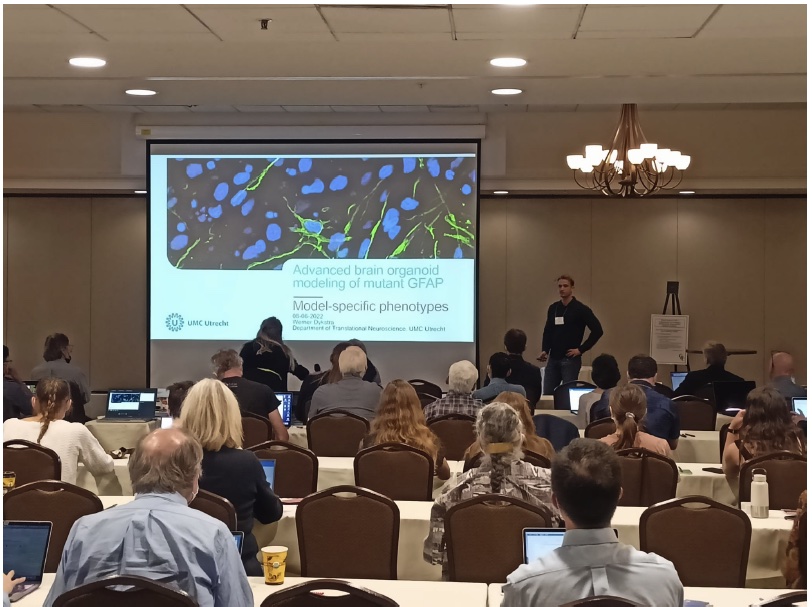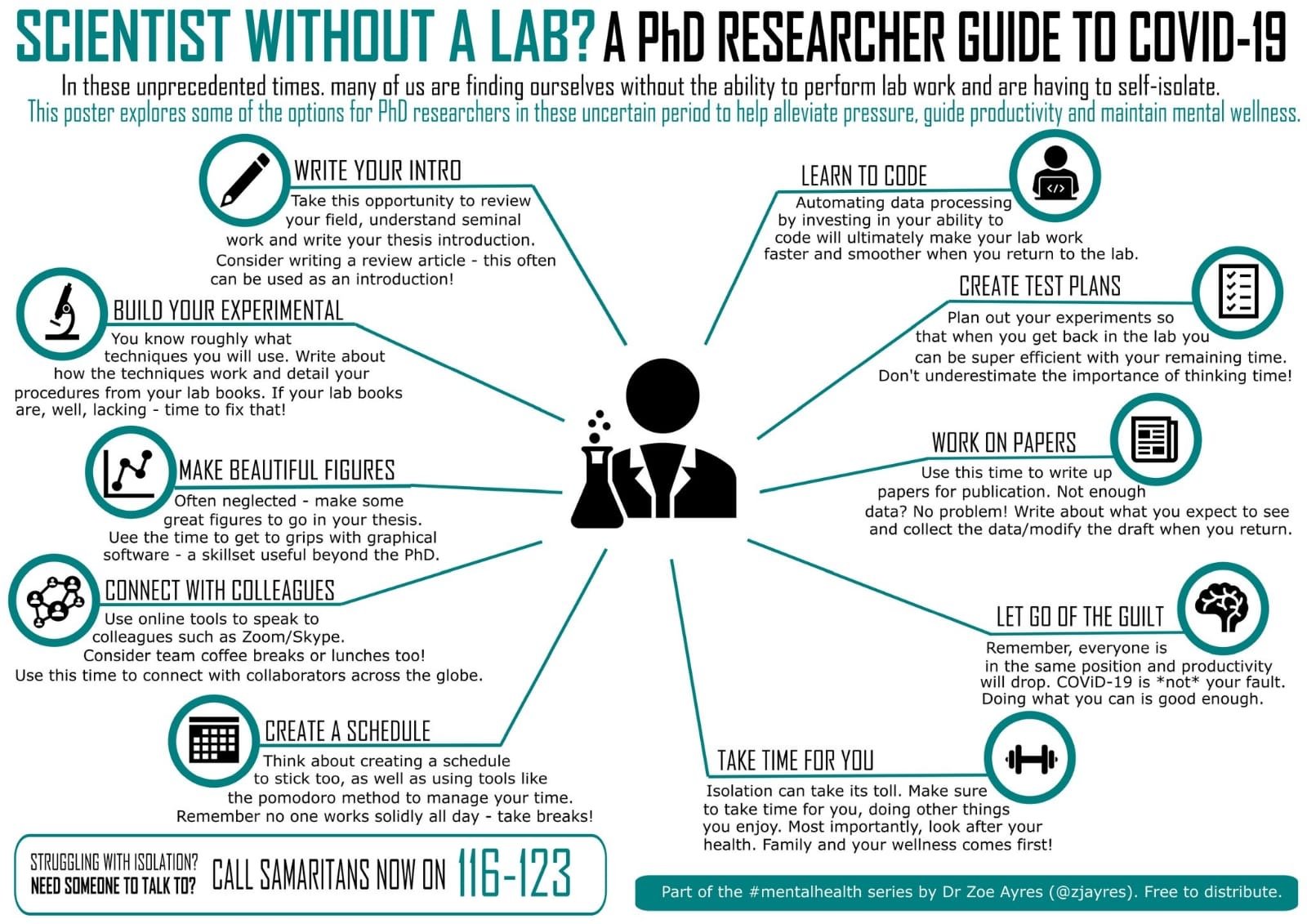News

Thank you, Christina
.jpeg)
During the conference, I got to give a present a poster of the results of my first prospective research project on cerebral blood flow postnatally and after surgery in these patients (the poster size requirements were also very American: 2 meters!). The poster was well received and fitted nicely within other novel findings in the field. It was very encouraging to discuss our research and gain some new perspectives on our findings. The conference was also a great opportunity to get to know my research and clinical colleagues better while eating a hot dog during a baseball game of the Washington Nationals! Of course, I also took to opportunity to see some of Washingtons highlights along the National Mall. Unfortunately, Biden was not able to have a look at my poster…
This conference was a very memorable experience and I am really happy that the CEN travel grant helped to make this possible.
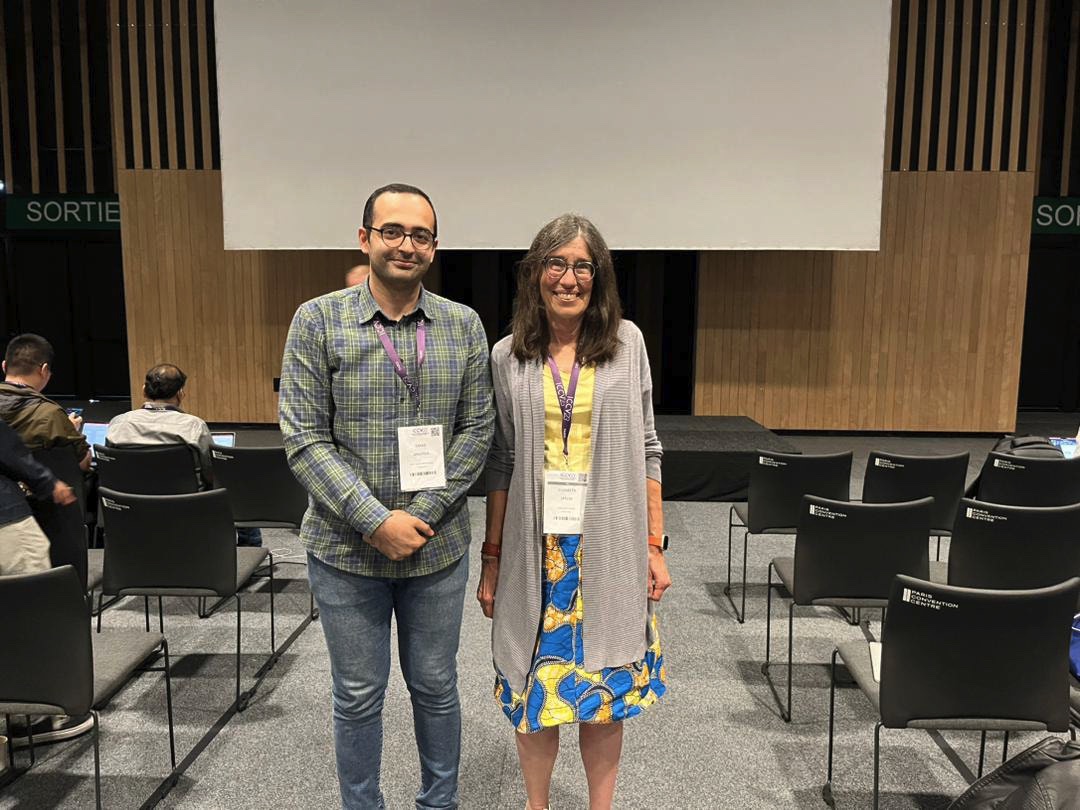
ICCV Highlights
In contrast to what may seem at first, the computer vision conferences can be very insightful for researchers in hospital. I had the chance of discussion with smart people in AI area and learn from their on-edge knowledge things that could potentially help me with my own research in WKZ. Here are some state-of-the art AI topics that could be used in biomedical data analysis:
Integration of Different Spatial Latent Space for Multimodal Data Analysis
One of the key highlights of ICCV2023 was the discussion on integrating spatial latent spaces for multimodal data analysis. The insights shared at the conference have the potential to enhance the analysis of diverse data types in neonatology, which is essential for improving medical diagnoses and patient care.
Low-Ranking SVD Learning for Signal Denoising
Low-Ranking Singular Value Decomposition (SVD) Learning was another notable topic at ICCV2023. This technique's application in signal denoising has direct relevance to neonatal care. By reducing noise and enhancing the quality of vital signals, it can significantly improve patient monitoring and diagnosis.
Text-to-Image Fusion with Image for MRI Segmentation
The conference extensively discussed the fusion of text and image data for MRI segmentation, which is highly relevant in neonatal care. Improved MRI analysis is crucial for neonatal diagnosis and treatment. The advancements in this area present promising opportunities for enhancing neonatal healthcare.
Improving 3D Imaging Quality with Diffusion, GNN, and Attention
The utilization of diffusion, Graph Neural Networks (GNN), and attention mechanisms for improving 3D image reconstruction of MRI was a standout topic. This innovation has the potential to revolutionize 3D imaging in neonatology, facilitating more accurate diagnosis and monitoring of neonatal patients.
Self-Supervised Large Language Models (LLM) for Automatic EEG Scoring
The application of self-supervised Large Language Models for automatic EEG scoring is particularly promising for automating EEG interpretation in neonatology. This technology could enhance the efficiency and accuracy of monitoring neonatal brain activity.
Conclusion
ICCV2023 was a valuable and informative experience, despite attending alone. The conference provided insights into cutting-edge developments in computer vision that have significant implications for my field of biomedical signal processing in neonatology. The topics discussed, including the integration of spatial latent spaces, low-ranking SVD learning, text-to-image fusion for MRI segmentation, improved 3D imaging quality, and self-supervised Large Language Models for EEG scoring, have the potential to advance neonatal healthcare and research.
Acknowledgments
I extend my gratitude to the ICCV2023 organizers and presenters for making this conference a valuable experience. The knowledge gained will play a crucial role in shaping the future of my research in neonatology. Here I should thank the grant providers in UMC Utrecht who helped me participate in one of the most important scientific conferences of the recent decade. My especial gratitude goes to Dr Geert Ramakers for his responsible endeavor for helping me to get this grant.
P.s. I had the great opportunity of meeting and personal in-person discussion with the famous cognitive psycholinguistic, Elizabeth Spelke, the writer of famous book “What babies know”. This is by far the best experience of any gathering for me!
Then the second task: finishing and polishing our work to present in Sweden. Although this gave us the natural pressure to perform, it also put some more excitement in our work. Where the one spent many of hours behind a microscope (Anna), the other worked on epigenetic sequencing (Tiziana). This showed how our work started together within the BrainScapes consortium as single cell sequencers of the ventral tegmental area and was now really diverging in individual specialities. For each it brought challenges but in the end we set off to Sweden proud of the products produced and ready to present.
And then came the third and final task: presenting. Each very differently but most rewarding. The best part was meeting new people, discussing our work and as a highlight the ‘ooees’ and ‘wows’ in the room when Anna presented beautiful 3D images of the human ventral tegmental area. The rest of our time was filled by long days full of interesting lectures and walking along the hundreds of posters on the floor. The days officially started at 8:30 and ended at 19:30 and were filled with a plenary lecture in a big hall that could fit all the 4,000 attendees, followed by 4 rounds of 6 parallel sessions with widespread topics. The talks were given by both senior and junior scientists, which made the program and discussions very versatile. The was a fancy app that showed the program with all the abstracts and speakers, so everybody could make their personalized program to follow. You could find us at sessions about our current research and personal interests, such as genetics of neurodegeneration, neuroinflammation at the cellular level focusing on glial cells, and Tau pathology. One of the highlights was the talk of Dr. Beth Stevens, one of the big names in microglia research. There were also industry symposiums, of which we attended the very impressive talk from spatial omics company NanoString, showing us the newest and coolest technologies in the field but also gave us an interesting sneak peak in industry. In between the sessions there was enough time to socialize with novel and previously established contacts, while enjoying the delicious coffee that was served by the big pharma companies Lilly and Roche.
We were also able to explore Gothenburg on our first day, experiencing the Swedish culture and eating some delicious food. We stayed in a little red Swedish hut in the forest, where we sometimes prepared dinner ourselves and could relax from all the impressions of the day. We also made an encounter with a deer twice, which made this experience extra Swedish and special. We want to thank CEN for rewarding us both with a travel grant, so we could have this weeklong experience. It has definitely shown us the current progress in both clinical and fundamental research on the topic of neurodegenerative diseases and given us the opportunity to also share our research.
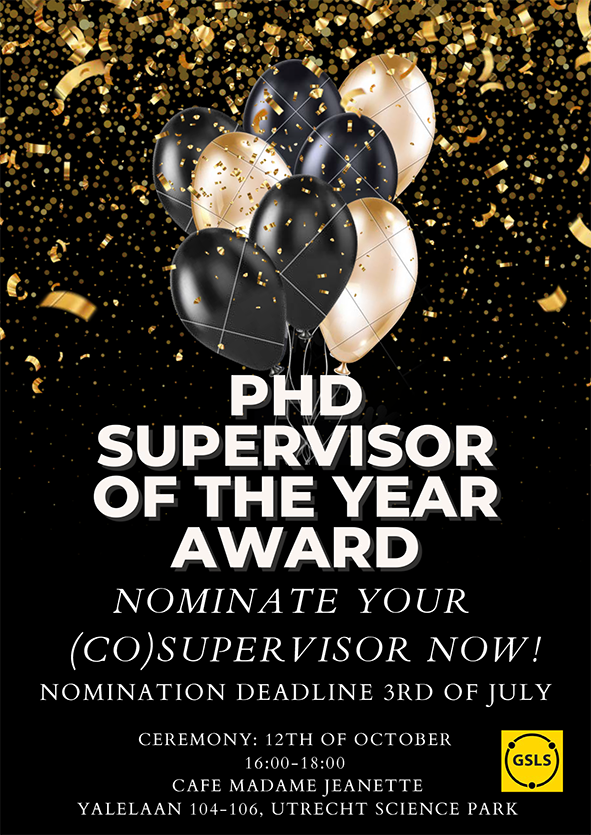
CALL FOR NOMINATIONS
Now, you are invited to nominate your (co-)supervisors! You can describe why you think that your (co-)supervisor is a brilliant scientist, a role model, accessible, enthusiastic, or just great in any other way.
You can access the nomination form via this link: https://survey.uu.nl/jfe/form/SV_emHM7IPSrdY1QUe
Nomination form will close July 3rd. By nominating your (co-)supervisor you show your appreciation for the way of supervision and we would like to inspire other (co-)supervisors to guide their PhD candidates in the best way possible.
Best wishes,
The Supervisor of the Year committee,
GSLS PhD Council
Introduction to R for Life Sciences
Would you like to learn how to analyse large datasets in an appropriate way? R is widely used for statistical computing and provides a wide variety of libraries for data manipulation, modelling and visualisation.
Introduction to Python for Life Sciences
Is your dataset too large or too complicated to load and process in Microsoft Excel? Get an introduction in Python and learn some basic functions and scripts.
Introduction to the Command Line
Linux is a popular operating system among bioinformaticians. Once familiar with the command line (the text-based interface) you will find it to be very efficient and powerful to use for your analyses.
Introduction to Research Data Management
Proper management of research data is a requirement by the university but also by funding agencies and publishers. Learn how to efficiently store and reuse data and the available techniques, to make these tasks easier.
Bring Your Own Data: Create figures in R using ggplot2
Learn how to make figures for your publications using the R package ggplot2. The trainer can assist you in choosing the correct statistics to apply to your data.
Bring Your Own Data: Create figures in Python
Learn how to make figures for your publications using Python and let the trainer help you in choosing the correct statistics to apply to your data.
Bring Your Own Data: R-coding for analysing RNA-seq data
You will learn the steps needed to analyse your processed RNA-seq data (count tables) using R. In addition, you will create figures to visualise your data using ggplot2.
Bring Your Own Data: Analysing Metagenomics
Explore your own metagenomics data step-by-step. The trainer will guide you through the available statistical methods and visualisation options.
Come and join us!
Turn your data to gold.
If you need help and/or support to organise a meeting: contact Geert!
Dates: 2 - 8 July 2023
Venue: Lausanne, Switzerland
Application deadline: 13 March 2023
Chen Science Writer Award and stipends are available!
Start your application! Apply by 13 March 2023
Scientific chairs:
Brian McCabe
Brain Mind Institute, EPFL, Switzerland
Carl Petersen
Brain Mind Institute, EPFL, Switzerland
Faculty members:
Silvia Arber, University of Basel, Switzerland
Daniel Huber, University of Geneva, Switzerland
Ariel Levine, NIH, USA
Mackenzie Mathis, EPFL, Switzerland
Pavan Ramdya, EPFL, Switzerland
Cristin Welle, University of Colorado, USA
Claire Wyart, INSERM & ICM, France
https://www.fens.org/careers/grants-and-stipends/grant/fens-ibro-perc-exchange-fellowships
For every edition, an amazing keynote speaker will give an inspiring lecture. The program, compiled by a number of enthusiastic PhD students from the different laboratory departments, can be find below and in the attachment.
FIRST LECTURE: January 30 – 4-5pm – prof. dr. Pietro Fratta
Prof. dr. Pietro Fratta is an expert in the field of Motor Neuron Diseases with experience using iPSC-derived models, long-read RNA sequencing, and high-throughput bioinformatics. His talk is titled: ‘Cryptic exons in ALS’.
More information will follow soon.
For the first lecture, there will be a festive opening including drinks!
So mark all the dates in your calendar and we are looking forward to see you there!
Kind regards,
The Rudolf Magnus Seminar Series committee
Oxana Garritsen, Dyan Ramekers, Myrna Brandt, Sara de Palma,
Esther van Leeuwen, Eileen Brouwer, Charlotte van Dijk, Maria Zwartkruis
Geert Ramakers, Marjolein Sneeboer and Elly Hol
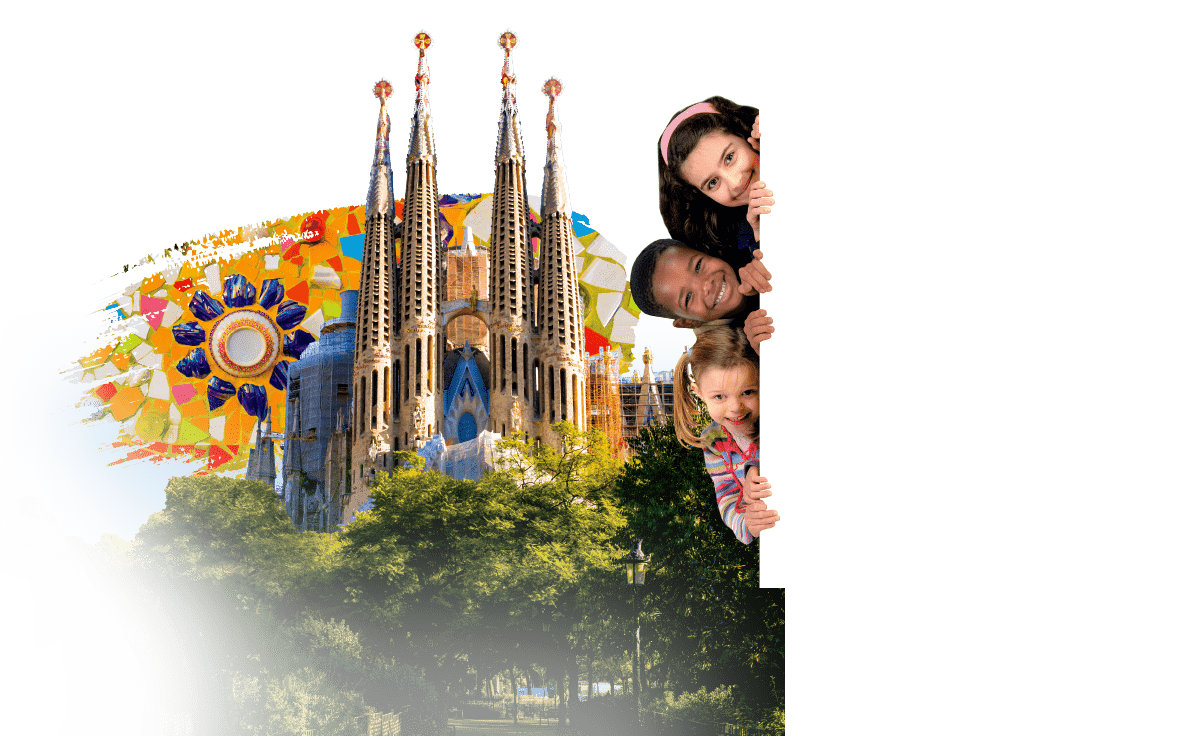
The broad scientific program allowed me to get an update on topics close to my research field (such as new candidate drugs for neonatal neuroprotection and machine learning to predict neonatal encephalopathy), as well as other topics within the field of neonatology and pediatrics. In addition to the main program, there was sufficient room to get in touch with other scientists and discuss my research during the poster sessions and social events.
Highlights for me included the great overview of adjunctive therapies for neonatal encephalopathy by Nicola Robertson (which will be of great help in the preparation of my PhD defense), the beautiful presentations in the young investigator award session, and the story of the revival of Anne Greene illustrating intensive care in the 17th century. But most of all I enjoyed the company of my research group, who gave beautiful (poster-)presentations during the congress, joined me in exploring the city, and made the Spanish tapas taste even better!
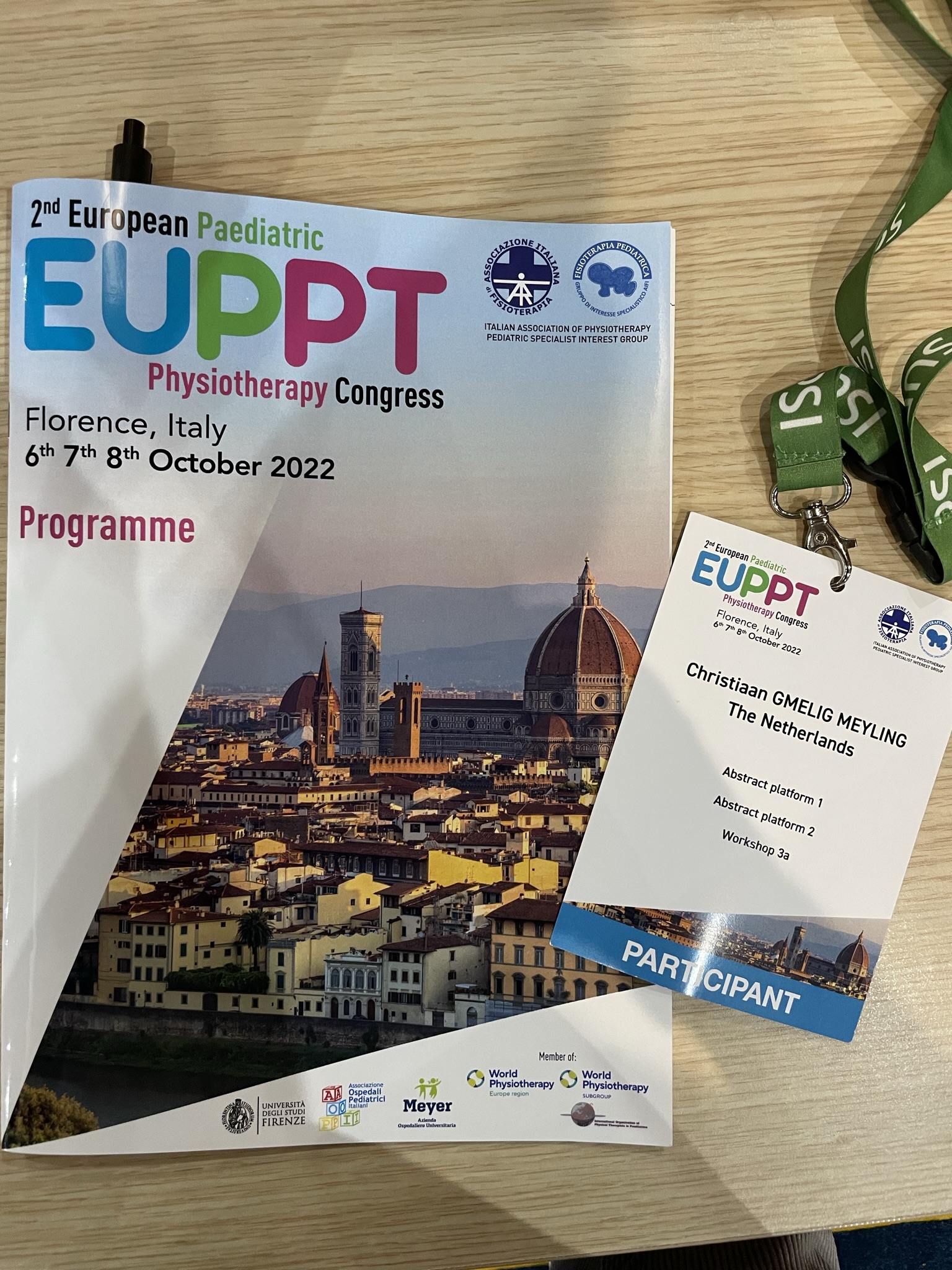
In addition, a meeting was organized to discuss the opportunities for an European Research Network for pediatric physiotherapists. It was really nice to experience the common drive to connect research in the field of pediatric physiotherapy with clinical practice, and to make knowledge available for all pediatric physiotherapists in Europe. Although the development of an European Research Network is in its infancy, the plans and ideas are promising for the future of pediatric physiotherapy in Europe. I’m looking forward to contribute to this important development.
For me, this congress was a great success and I have had a great time in Florence! I’m proud to have positioned my PhD-research at European level and to have strengthened my European network in this regard. And last but not least, I really enjoyed the friendship with my colleagues with a great glass of Italian wine!
Christiaan Gmelig Meyling, PhD-Candidate Center of Excellence in Rehabilitation Medicine, Utrecht.
Summary 2nd European Congress for Pediatric Physiotherapy (EUPPT) 2022, 6-8 October 2022, Florence Italy
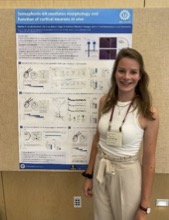
And then the science started! Luckily my jetlag was getting better, because the programme of this conference was set to fit as much science as possible in a couple of days. There were talks and keynote lectures from 9:00 to 17:00, followed by dinner and poster presentations from 19:30-22:30. Talks were organised in themed sessions, covering subjects such as axon and dendrite targeting, synapse development, circuit wiring, and axon regeneration and plasticity. The nice aspect of this conference is that not only the PI’s are presenting, but also many graduate students and postdocs got the opportunity to talk about their research. All the talks were scheduled in one plenary auditorium, so there were no parallel sessions, and they lasted 15 minutes which is just right for your attention span. I was truly amazed and also impressed by the quality of these talks and the cool techniques that were described, such as the development of photoswitchable kinases that regulateendogenous protein activity and can be used to modulate spine formation and maturation.
Each day there was also one keynote speaker. In particular the keynote of Michael Greenberg, whose lab discovered Fos as a molecular marker of neuronal activity, stood out for me. Fos, or ‘Faws’ as Micheal pronounced it with his heavy Boston accent, is known to so many of us neuroscientists that you almost forget that there was ever a pre-Fos time. In this lecture he talked about how cell depolarization triggers the immediate early gene Fos and showed that this process is imperative for the reliable activity of the famous hippocampal place cells. Another keynote lecture was given by Alex Kolodkin, who described the first Semaphorin molecule as a respulsive guidance cue in the grasshopper embryo. Since then, dozens more Semaphorins have been discovered, one of which I am currently studying.
What is special about smaller conferences like this one - there were about 200 attendees this year – is that we all share a similar interest. This was also very noticeable during the poster sessions, which were very lively and full of discussions. At first I was a bit hesitant about three-hour long poster sessions in the late evening, but actually this was the most fun poster presentation I have ever done. I really enjoyed discussing my own work with so many people, but also many of the other posters were interesting and sometimes even useful for my own experiments.
However, during lunch and in the evenings there was also time to socialize. Since Cold Spring Harbor is located near the sea, as the name already implies, there is plenty of seafood. On the last evening it is therefore tradition to have cocktails and a lobster dinner, during which everyone is treated with a complete lobster and all the necessary lobster-eating tools, jumm… I have gotten quite competent with dissections over the years, but nonethelessdissecting the lobster turned out to be pretty difficult. After the lobsters were (attempted to be) eaten, the evening was closed off at the bar. After all, networking is important right! The next morning everyone got ready for the last few talks and after lunch the meeting was officially finished. For me it was obviously the first visit, but many of the PI’s were telling me that they have been coming here every meeting since the first time it was organized in 1998 (meaning that they have been to 13 of these meetings!). It is a nice way for them to catch up with old friends, talk science and see where the field is going in a very accessible setting. People said goodbye, but I am sure most of them will see each other again in September 2024 for their 14th Mechanisms of Neuronal Connectivity Meeting.

As a young scientist, gradually becoming more mature, I have been realizing that too many of us today are forced to reckon with constant obstacles that hinder our path for success. In this time, I have met very few fellow PhD students who have not remotely considered neglecting a scientific career, especially in Academia. Too many are asked to prioritize work, to meet insane deadlines, or to follow crazy schedules. Several are compelled to be versatile at all times: better writers, better thinkers, better communicators, and better doers. Many of us are forced to juggle between endless hours in the lab and to generate new solutions to emerging, difficult scientific problems while coping with constant peer pressure, keeping track of novel research, and navigating through the process of finding what type of scientist we want to be.
In a proven, unique format you will be exposed to a high-impact learning experience, taking you outside the comfort zone of your own technical expertise, that will empower you with new analytical and strategic skills across areas of neuroscience.
You will achieve a heightened awareness for fields of neuroscience relevant for your activity and, perhaps most important, you will gain a place within an elite global network of neuroscientists.
The venue provides the perfect setting to a relaxed yet intense learning atmosphere, with the stunning backdrop of Venice: each Advanced Course is the experience of a lifetime.
Marian Joels (former director of our PhD program) received the ALBA-KNE 2021 Diversity Award for her for constant efforts in fostering gender equality in neuroscience.
Watch this movie to learn why Marian received this award
